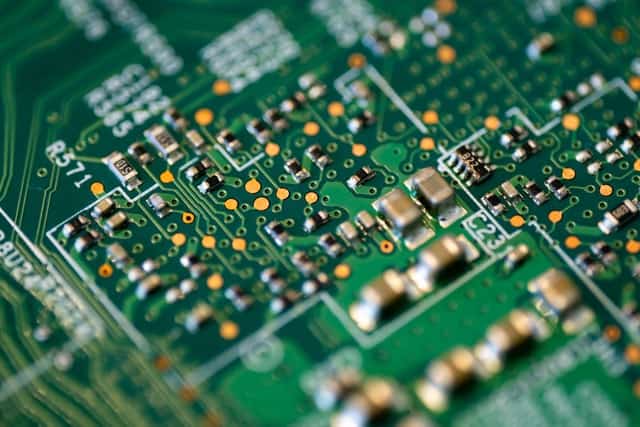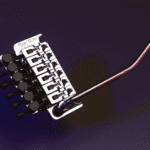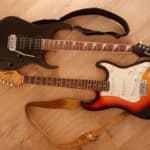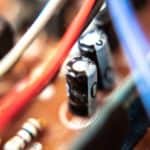Sometimes it’s hard to sort out exactly what is different under the hood of various amps.
Especially with advertising getting in your head and telling you that only a certain amp will help you achieve your musical dreams.
So what’s the deal? Are some amps just the same thing with a different logo slapped on them? Maybe so.
You can clone an amplifier’s circuit as long as it (or parts of it) is not protected by a patent, which only lasts for twenty years. But you can’t copy the schematic, PCB, or trademarked names and logos. This is good news for hobbyists and manufacturers and I think it is good news for consumers too.
Before we get into my interpretation of the legal side of cloning amp circuits, I should say that I am in no way a legal scholar.
So while I hope the information that I have gathered is helpful, I am not encouraging you to start your own company without doing careful research or getting proper legal counsel.
With that taken care of, here’s my take on the issue…
Are guitar amp circuits protected by copyright or patents?
I will be focusing on how things work in the USA since a lot of famous amplifier companies are in the USA.
There are three things to examine if you are considering cloning an amplifier: trademark, copyright, and patent.
We will deal with the trademark later so let’s start with copyright.
It is easy to think of copyright as referring to “artistic endeavors” like writings, recordings, etc.
For our purposes, the schematics of electronic circuits can be copyrighted but that doesn’t mean that the circuit itself is copyrighted.
Also, the specific design of a printed circuit board can be copyrighted so you can’t just directly copy it if that is the case (but you could rearrange it).
The design of semiconductor chips is actually covered by copyright law as well.
The most important part of this issue is patent law.
Amplifiers can qualify for utility patents, which apply to new ideas or functions for which the applicant has a prototype/working model.
You cannot patent just an idea.
So how does this affect amplifiers?
Is it legal to make a clone of a famous guitar amp?
A utility patent is valid for twenty years from the application date. So most famous amplifier circuits do not have valid patents anymore even if they did at some point in the past.
So as far as I understand it, the circuit of something like a Fender Champ model is anyone’s game at this point.
But remember the schematic and PCB layout could still be covered by copyright law, which lasts longer.
And certain newer features/technologies of modern amps could be covered by patents too.
Basically, you could build a clone of most amplifiers but specific parts of the amplifier could be off-limits in this case.
Is it legal to make a clone of a guitar amp and then sell it?
If you want to make a clone of an amplifier that is not patented then I think you are good to go.
If the amp circuit/technology in question is patented then you could still build and sell it provided you have an agreement with the patent holder.
And by agreement I mean you will have to pay them for usage rights. It’s not just the research and development that you are paying for; applying for and maintaining patent protection costs money.
Now if you are outside of the USA or the country where the patent is held, I don’t think it really matters because it isn’t enforceable, but you won’t be able to sell/export to the country of origin.
Most USA companies use foreign manufacturing these days and basically give away their trade secrets, choosing to rely on the power of their brand name.
Is it ethical to clone a guitar amp?
The US government set a limit of twenty years on patents to encourage companies to keep innovating and stimulate competition.
There are plenty of companies that try to put their own new spin on old technologies and consumers usually appreciate that. In the music industry, Harley Benton guitars out of Europe are often criticized for too-closely copying other manufacturers because a lot of musicians are loyal to their favorite brands.
I think it’s a bit of a dirty business model too but Harley Benton also sells a lot of instruments.
I’m not going to argue about what is ethical or unethical because business is business and I can empathize with both sides.
For example let’s return to amplifiers and the current line of Fender ‘57 Custom Champ amps, which sell for $1200!
They are hand-wired, have 5-watts of tube power, an 8” Weber speaker, and I’m sure they have quality components but…there just isn’t that much inside of those amps compared to others.
Were they hand-wired by a brain surgeon? So I think they are way overpriced and many other people agree.
Not to worry, if you don’t care about brand names Monoprice makes a Champ clone under its Stage Right brand with a Celestion speaker for $160 (it doesn’t use a tube rectifier as the Fender does).
That’s a massive difference in price and they may not be exactly the same but if famous brands raise their prices to the point that people think they are being ripped off, someone will step in with a more affordable option. Is it ethical?
I don’t know but it’s certainly economical.
Where is the limit when cloning an amp?
So even if you can clone some amps’ circuits you can’t use their trademarks.
That falls in the realm of counterfeiting and almost everyone hates that.
Trademarks cover words, logos, decorative shapes (guitar bodies and headstocks), and the like.
So you have to come up with a different name that still lets people know what you’re offering.
One of the best examples I have ever seen was a mobile phone version of the old Microsoft Windows game Rodent’s Revenge which was named Rat’s Retaliation.
How does it work in the amp industry? With modeling amps and software you probably see it a lot these days.
I have a Roland Cube amp nearby so I will list the amp models it features and try to figure out what trademarks they are suggesting:
- Acoustic Sim –
- JC Clean – Roland’s own Jazz Chorus amps
- Black Panel – various Fender tube amps
- Brit Combo – Vox AC series amps?
- Classic Stack – Marshall tube amps
- R-Fier Stack – Mesa/Boogie Rectifier series amps
- Extreme – Peavey Triple XXX amps or maybe just “extreme”
- Mic –
So as long as you aren’t counterfeiting you can copy other companies’ amps (albeit digitally and not the actual circuit in this case).
You just have to come up with a different name.
Amp clones can lead to new sounds and options
I think the twenty-year limit on patents that was set by the US government does a pretty good job of driving innovation.
It keeps companies on their toes and researching to come up with things that would qualify for a new patent. And it keeps competition strong in the market for existing technologies.
Maybe you have seen an amp that is almost everything you want except it doesn’t have reverb or a 3-band EQ. Don’t worry.
Hopefully, another company will make a similar amp and tweak it a little, adding the missing features that will make it perfect for you.

Hello there, my name is Ramiro and I’ve been playing guitar for almost 20 years. I’m obsessed with everything gear-related and I thought it might be worth sharing it. From guitars, pedals, amps, and synths to studio gear and production tips, I hope you find what I post here useful, and I’ll try my best to keep it entertaining also.





